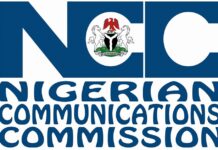The managing Director of World Telecom Labs (WTL), Mr Leigh Smith has deplored the poor deployment available spectrum in Nigeria, saying the resource was being wasted.
Spectrum relates to the radio frequencies allocated to the mobile industry and other sectors for communication over the airwaves.
Spectrum is a sovereign asset. That is, use of the airwaves in each country is overseen by the government or the designated national regulatory authority, which manages the radio spectrum and issues spectrum licenses.
Smith urged the NCC to incentivize operators to use their unused spectrum for new shared networks in rural Nigeria where there is little or no coverage at the moment, advising that these rural networks should be built by a neutral service provider and used by existing operators. He said allocating USF money to the CAPEX cost of such networks would reduce the risk and national roaming and infrastructure sharing will enable people to use the network of other service providers in Nigeria where their own service provider does not have a network or has limited network coverage.
In effect, operators share their infrastructure thus eliminating the need to lay duplicate infrastructures in areas where this is not commercially feasible.
Smith spoke while assessing the GSMA’s recent report on Nigeria which concluded that “mobile technology is having a direct and positive impact on the daily lives of Nigerians by fostering inclusive growth and enhancing the productivity and efficiency of the economy”.
However, the company was disappointed to read the GSMA estimates of mobile penetration of 49% rising to 55% by 2025 whilst only 4% have 4G mobile broadband growing to 17% by 2025.
“The clue for this situation comes a little later in the report when spectrum is discussed. According to the GSMA, the total amount of spectrum assigned to mobile in Nigeria is 470MHz, far in excess of the SSA average of 268 MHz.
“However, they also go on to explain “some inefficiencies may exist in the utilisation of spectrum, as around a quarter of the spectrum assigned to mobile is being used by a few service providers that jointly account for less than 2% of the mobile market“, he said.
Smith said WTL is already working with wholesale operators in five countries in Africa to build rural networks and, with infrastructure sharing being widely considered across the continent, the company firmly believes that the removal of the CAPEX cost of building a rural network will encourage previously reluctant operators to start offering services in these areas.
WTL also believes that infrastructure sharing will be of great benefit to Nigerians with increased coverage, improved service levels and competition driving down costs.
Smith said, “Plenty of spectrum has been allocated but unfortunately a lot of it is being wasted because it is lying fallow in the hands of small and inactive license holders. I would encourage the NCC to adopt a “use it or lose it” approach. Our vision enables neutral 3rd party networks to be deployed where MNOS refuse to go, this would increase the overall footprint.”











